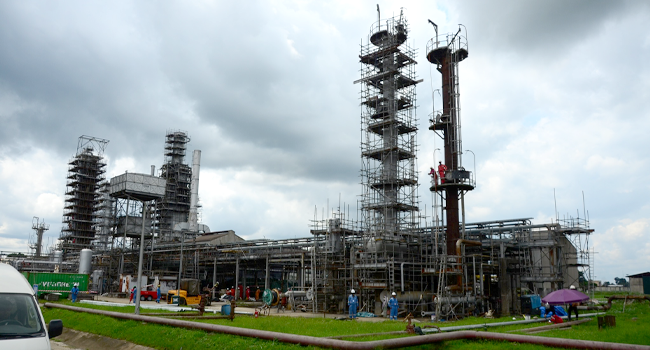The Port Harcourt Refinery has officially resumed full operations after a period of reduced activity, with officials confirming that the plant is back to distributing petroleum products.
This announcement was made on Sunday, December 1, 2024, by the refinery’s Managing Director, Mr. Ibrahim Onoja, who led a press tour of the facility.
Onoja confirmed that the refinery is now distributing key products such as Premium Motor Spirit (PMS), kerosene, and diesel. However, this move has sparked ongoing controversy, with some stakeholders questioning the validity of the claims made by the Nigerian National Petroleum Company (NNPC) Limited.
“We have resumed full operations,” Onoja stated firmly. “The refinery has undergone extensive upgrades to improve efficiency and reliability. Most of the equipment, including pump installations and cables, have been replaced.”
Onoja assured the public that the plant is fully operational and producing refined products for distribution. “The plant is running, and we are trucking out our products,” he said, signaling that the facility has resumed its role in supplying the Nigerian market with essential fuel products.
Despite these reassurances, the announcement has been met with skepticism, especially from members of the local community and stakeholders in the oil industry. Many are questioning whether the refinery is truly operating at full capacity, or if it is simply running on leftover stock.
Mr. Moyi Maidunama, the Director of Operations for the Nigeria Pipeline Storage Company (NPSC), acknowledged that there had been a temporary reduction in production. He explained that this was necessary to address technical issues and enhance the facility’s delivery capacity.
“Our operations were not totally halted but reduced,” Maidunama clarified. “We had to make improvements to increase the number of operational loading arms. We are managing the process with the trucks available today, and we are evacuating products.”
Maidunama assured that the refinery’s operations would return to normal soon, but the temporary scaling down had caused a delay in production.
Terminal Manager, Mr. Worlu Joel, also spoke about the current efficiency of the refinery, stating that it had begun loading key products like PMS, kerosene, and diesel. He mentioned that the facility has 11 functional loading bays, though only 3 are in use due to high efficiency.
“We have surplus product,” Joel said. “If we had up to 100 trucks today, we could evacuate them within five hours. However, the problem is not with the refinery; it’s with the tanker drivers. We can’t move products without the drivers showing up on time.”
Joel’s concerns reflect ongoing challenges with the logistics of moving the products from the refinery to the market. While the refinery is capable of evacuating products at a fast pace, a slow turnout of tanker drivers is hindering the distribution process.
This issue highlights one of the key challenges facing the Port Harcourt Refinery as it works to ramp up its operations. While the refinery claims to have the capacity to meet demand, its ability to efficiently distribute the products is dependent on external factors, such as the availability of tanker drivers.
The controversy surrounding the refinery’s operations began earlier this year when the NNPC announced that the Port Harcourt facility had resumed production after an extensive period of rehabilitation. The NNPC stated that the refinery was now operating at 70% of its installed capacity, and it would primarily produce diesel and Pour Fuel Oil, with a daily capacity of 1.5 million and 2.1 million litres, respectively.
However, there have been allegations from local stakeholders, including Timothy Mgbere, a leader from the Alesa community—the refinery’s host community—that the products being loaded from the refinery were not freshly refined. Mgbere claimed that the products were left in the storage tanks for the last three years, raising doubts about the refinery’s claims of fresh production.
“We have heard that products being loaded are not freshly refined,” Mgbere said. “The refinery is only working with products left in the storage tanks.”
Adding to the confusion, reports surfaced recently that the refinery had temporarily stopped operations, with some workers claiming the facility was undergoing calibration, which was expected to last until the following week.
The Port Harcourt Refining Company clarified these reports, stating that operations had not completely halted but had been scaled down to allow for necessary improvements at the facility.
Despite the ongoing doubts, the NNPC has remained confident in the refinery’s ability to contribute to Nigeria’s fuel supply. The corporation maintains that the Port Harcourt Refinery, along with the recently rehabilitated Warri and Kaduna refineries, is central to its strategy of reducing Nigeria’s reliance on imported fuel.

